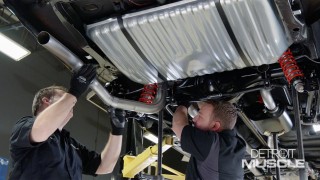Chevrolet Halts Production of the Camaro For This Reason

There is a semiconductor shortage that’s causing the auto industry some grief, and it’s taking a toll on General Motors. The automaker has slowed, and in some cases, stalled production at several plants throughout North America. In a recent report from The Detroit News, GM has completely halted the line at Lansing Grand River Assembly in Michigan.
So, what does this all mean? Unfortunately, it means that production of not only the Chevrolet Camaro, but the Cadillac CT4, and Cadillac CT5 are on pause as the automaker directs their efforts toward faster-selling SUVs and trucks. Even further, GM says that manufacturing won’t continue until the end of the month.
No matter how you spin it, this is bad news, but the affected models are far off from the highest volume sellers for GM. Rear-wheel-drive cars like the CT4, CT5, and the Camaro are the slowest-moving within the segment, which makes sense why the automaker would stall production of its worst-selling models and prioritize production elsewhere.

The spokesman for General Motors, David Barnas, told The Detroit News in a statement that “we continue working with our supply base to find solutions for our suppliers’ semiconductor requirements and to mitigate the impact on GM. Our intent is to make up as much production lost at these plants as possible.”
General Motors predicts they’ll be in the neighborhood of 216,000 vehicles short this year. However, Ford and Stellantis are expecting slowdowns as well. Production hits could be as high as 20 percent, according to Ford, while Stellantis has slowed production at their Windsor Assembly Plant in Ontario, Canada.
Despite their numbers taking a hit, Stellantis and Ford have yet to halt production at any of its plants like General Motors is forced to do. Unfortunately, it appears the company was caught off-guard by the global shortage of semiconductors, which is in stark contrast to manufacturers like Toyota. Toyota had chips stockpiled because of previous experiences with similar supply chain issues.

Want to read more articles like this?
Join the PowerNation Email NewsletterRead More from PowerNation
- Chapters
- descriptions off, selected
- captions off, selected
This is a modal window.









